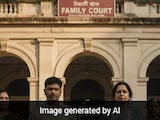In 5 sittings since May this year, the Forest Advisory Committee cleared 85 per cent of the 69 proposals it received for clearances
New Delhi:
The Forest Advisory Committee (FAC), the central body in charge of reviewing all industrial and infrastructure projects diverting forest land, has since May not rejected a single proposal, clearing even those rejected by the previous government.
In its 5 sittings since May this year, the committee cleared 85 per cent of the 69 proposals it received for clearances. The recommended projects cover 33,915 acres of forest land.
In the remaining 15 per cent of the cases, it has sought more information.
While a high rate of clearances is not unique to the current FAC, what has raised worries is greenlighting projects rejected by previous FAC's for posing environmental and social risks, without due diligence.
Among those cleared in a September meeting of the FAC is a 3000 MW hydroelectric project on the Dibang river in Arunachal Pradesh, which will lead to the diversion of 11,000 acres of prime forest land as well as displace local tribal communities.
Environmental lawyer Ritwick Dutta said, "There is local opposition. It will involve the cutting of over 3.5 lakh tress and this is an area where you have indigenous species, including tigers."
The project was rejected in April by the previous FAC under the UPA government. Curiously, it was even rejected once by the new FAC set up under the NDA government, despite the project proponents resubmitted a proposal with some modifications. The Environment Ministry issued a letter in August saying "decrease in dam height and consequent sacrifice in power generation beyond 10 mts reduction is not commensurate with saving forest land."
But the same proposal came back before the FAC in September without any further changes, and yet it was cleared at that meeting. No specific reasons were cited.
Activists say the government is able to bulldoze projects by appointing as independent members to FAC those who would not raise objections and will toe its line.
Of the two independent members newly appointed to the committee, one is a full-time activist with the RSS's tribal wing in Maharashtra.
Chaitram Pawar is the vice president of the RSS's Vanvasi Kalyan Ashram in Maharashtra, inducted into the committee in August. He has led community afforestation efforts in his district of Dhule in North Maharashtra with the support of the Ashram, with which he's been associated for over 30 years.
When we asked him how the Dibang Valley project was cleared, he seemed unclear about the details. "It was my first sitting," he told NDTV. "When the Dibang topic came, I did not have much knowledge about it."
What was even more baffling was his response to our question about the displacement of tribals by the project. He says he was told that "a Maharashtrian tribal is different than this area's (North East) tribal as they don't have many benefits and they would easily be ready to shift."
The other independent member of the FAC is Ramesh K Dave, a retired Madhya Pradesh principal conservator of forests. When we asked him about the Dibang Valley project he said, "It was an area that needed development; so, we had to pass it."
The UPA was no better when it came to the large scale clearing of projects, in its ten years approving nearly 11,000 projects and rejecting only 300, a rejection rate of less than 1 per cent.
But among the FAC's non-official members during that time were environmental historian Mahesh Rangarajan, sociologist Amita Baviskar and wildlife biologist, Ullas Karanth, among others. This ensured that there was some resistance to at least a handful of projects that raised major environmental red flags.
Dr Karanth told NDTV that the independent members have a crucial role, and necessarily an antagonistic one. "The FAC is the brake and the economic industry and the project proponents are the engines," he said. "So if you have to regulate the engine, you need the brake and steering wheel. It's not just there to nod your head and pass things."
In its 5 sittings since May this year, the committee cleared 85 per cent of the 69 proposals it received for clearances. The recommended projects cover 33,915 acres of forest land.
In the remaining 15 per cent of the cases, it has sought more information.
While a high rate of clearances is not unique to the current FAC, what has raised worries is greenlighting projects rejected by previous FAC's for posing environmental and social risks, without due diligence.
Among those cleared in a September meeting of the FAC is a 3000 MW hydroelectric project on the Dibang river in Arunachal Pradesh, which will lead to the diversion of 11,000 acres of prime forest land as well as displace local tribal communities.
Environmental lawyer Ritwick Dutta said, "There is local opposition. It will involve the cutting of over 3.5 lakh tress and this is an area where you have indigenous species, including tigers."
The project was rejected in April by the previous FAC under the UPA government. Curiously, it was even rejected once by the new FAC set up under the NDA government, despite the project proponents resubmitted a proposal with some modifications. The Environment Ministry issued a letter in August saying "decrease in dam height and consequent sacrifice in power generation beyond 10 mts reduction is not commensurate with saving forest land."
But the same proposal came back before the FAC in September without any further changes, and yet it was cleared at that meeting. No specific reasons were cited.
Activists say the government is able to bulldoze projects by appointing as independent members to FAC those who would not raise objections and will toe its line.
Of the two independent members newly appointed to the committee, one is a full-time activist with the RSS's tribal wing in Maharashtra.
Chaitram Pawar is the vice president of the RSS's Vanvasi Kalyan Ashram in Maharashtra, inducted into the committee in August. He has led community afforestation efforts in his district of Dhule in North Maharashtra with the support of the Ashram, with which he's been associated for over 30 years.
When we asked him how the Dibang Valley project was cleared, he seemed unclear about the details. "It was my first sitting," he told NDTV. "When the Dibang topic came, I did not have much knowledge about it."
What was even more baffling was his response to our question about the displacement of tribals by the project. He says he was told that "a Maharashtrian tribal is different than this area's (North East) tribal as they don't have many benefits and they would easily be ready to shift."
The other independent member of the FAC is Ramesh K Dave, a retired Madhya Pradesh principal conservator of forests. When we asked him about the Dibang Valley project he said, "It was an area that needed development; so, we had to pass it."
The UPA was no better when it came to the large scale clearing of projects, in its ten years approving nearly 11,000 projects and rejecting only 300, a rejection rate of less than 1 per cent.
But among the FAC's non-official members during that time were environmental historian Mahesh Rangarajan, sociologist Amita Baviskar and wildlife biologist, Ullas Karanth, among others. This ensured that there was some resistance to at least a handful of projects that raised major environmental red flags.
Dr Karanth told NDTV that the independent members have a crucial role, and necessarily an antagonistic one. "The FAC is the brake and the economic industry and the project proponents are the engines," he said. "So if you have to regulate the engine, you need the brake and steering wheel. It's not just there to nod your head and pass things."















